Triple Negative – God Bless the Death Drive LP
£18.00
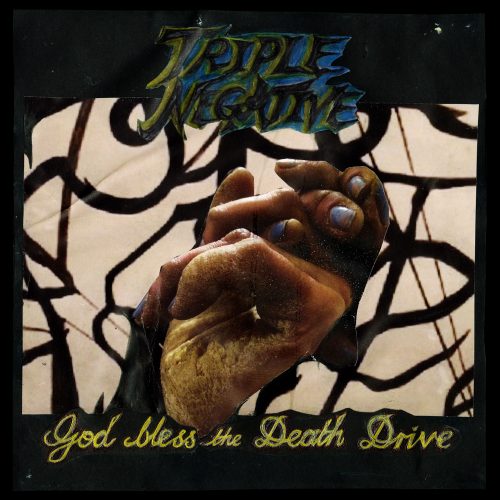 Literally taking off where the acclaimed Precious Waste in our Wake LP finished off, London based outfit Triple Negative return with another exemplary amplified jigsaw puzzle. The playback of this reality is garnished with humour, bedlam, beauty and a robust fear of the predictable. As payback for your acknowledgment our international line-up deliver a disparate mix of genres and histographies rendered into a devious dish of rhythm, song, balladry and nerve. This is Not This Heat. A.Kostis/Kostas Bezos’ ‘Stin Ypoga’ (1930) is the template for Bad emotional investments whilst the haunting Fine Cargo Lacquer takes flight from the morbidly on point novel The Death Ship by B. Traven. God Bless the Death Drive could be construed as a compass to navigate the wayward wonder we inhabit or it can just be enjoyed. This second full length steers into scathed realms of everyday junk and poignant punk, all pressed down on the lowest quality ethylene and chlorine. Triple Negative return with another stamped digest of hope as joke, noise and song, rollicking rhythm and seasick soul. Edition of 500 copies in high gloss sleeve with printed comic book inner sleeve.
Literally taking off where the acclaimed Precious Waste in our Wake LP finished off, London based outfit Triple Negative return with another exemplary amplified jigsaw puzzle. The playback of this reality is garnished with humour, bedlam, beauty and a robust fear of the predictable. As payback for your acknowledgment our international line-up deliver a disparate mix of genres and histographies rendered into a devious dish of rhythm, song, balladry and nerve. This is Not This Heat. A.Kostis/Kostas Bezos’ ‘Stin Ypoga’ (1930) is the template for Bad emotional investments whilst the haunting Fine Cargo Lacquer takes flight from the morbidly on point novel The Death Ship by B. Traven. God Bless the Death Drive could be construed as a compass to navigate the wayward wonder we inhabit or it can just be enjoyed. This second full length steers into scathed realms of everyday junk and poignant punk, all pressed down on the lowest quality ethylene and chlorine. Triple Negative return with another stamped digest of hope as joke, noise and song, rollicking rhythm and seasick soul. Edition of 500 copies in high gloss sleeve with printed comic book inner sleeve.
Reviews:
Precious Waste in Our Wake, the mysterious UK collective Triple Negative’s debut LP from last year, was and is many things: one of my favorite releases of 2019, the oddest and most compelling contemporary remnant of circa-1980 avant-rock explorations, a fittingly surreal soundtrack to our progressively deteriorating society and world. God knows what sort of headspace these mysterious magic-molders place themselves in to create this bizarre and befuddling music, but there seems to be no shortage in its supply because another full-length declaration has already surfaced less than a year later. When God Bless the Death Drive is said to “literally [take] off where… Precious Waste in our Wake finished,” it’s pretty much accurate; the mastering is louder and clearer, and “Bad Grace” begins with a propulsive, bouncing gallop of minimal percussion and blown-out vocalizing that does contrast with the drugged-out lethargy of the grooves on its predecessor, but listen to the two back to back and the momentum transfer is undeniable—”MERCURIAL SEAL / SINKINGSINKING SUNK” and “Bad Grace,” despite sounding markedly different, continue into one another. It’s a nice touch that meaningfully links the albums despite the new direction that God Bless takes. With bone-dry guitar tones and dusty, windswept percussion recordings, songs like “Bad Emotional Investments” become worn, sun-cracked psychedelic ballads, while the apocalyptic strings and winds on “Pugno Di Mosche” and distant churn of “Low Noon” allow some of the familiar smog to seep in. A soothing accordion and intimate vocals even make “Fine Cargo Lacquer”—dare I say—pretty. The level of coherence across God Bless the Death Drive is variable, to say the least, and this range makes it even more difficult to fully digest. The three-track stretch of “See It Slay It Sordid,” “Nag Head’s Spools,” and “Your Pretty Mental Health…” alone is a dense Twin Infinitives–tier conundrum. At first I found myself thinking, well this is not what I expected, but I quickly realized that’s a stupid thing to even consider when Triple Negative is at work. As Mark Harwood states, you can always rely on their music to possess a “robust fear of the predictable.”
Fucked up Rebetika covers, sizzled shanties and possessed communal shenanigans from punk rabble Triple Negative. Cranky as owt and full of bone jangling voodoo; huff it up!
Triple Negative’s debut LP ‘Precious Waste In Our Wake’ may have been my #1 of 2019 and ‘God Bless The Death Drive’ picks up right where that one left off. Someone once told me a member of Sydney’s most cacophonous “post-punk” group The Slugfuckers ditched his involvement in the subversive-youth-music scene and became solely interested in African music. At points Triple Negative sound like what could have been if that interest merged into the existing chaos of The Slugfuckers. I hope I’m not painting a picture of conservatorium trained polyrhythm groovers, as this is some apocalyptic, attuned to the ancient rhythms of Middle-Earth shit. Like if This Heat was armed with dirty mattress-ed sharehouse equipment, or a Scott Walker record produced by Small Cruel Party. It’s a distinct approach being a “lo-fi” uuuh “rock band”, I guess? I don’t know if there’s any kinship with Penultimate Press labelmates Księżyc but there’s a link to some mythic European folk stylings, although abstracted in very different way. A band like no other!
I keep missing this lot live which means I keep missing out, I hear. The first time I got hold of a Triple Negative album, me and my mate Louis listened to it twice in a row at the wrong speed, but I enjoyed it just as much once we’d got it back up to pace, concluding that the best rpm for enjoyment depended on one’s mood. Anyone else feel like there’s something brewing re: a new generation of oddball gnarly post punk bands of various stripes? If there is a second wave coming, this lot are at the vanguard, maybe a bit off to the side.
Without wanting to trivialise their work, it is the sort of record I like listening to when I have to go and buy shoes. It pipes in a stagnant, seething, undertow – a dirty and alive algae of sound, to counteract the hot discomfort of strip lighting and mass manufacture in the New Look shoe section. It reminds me I don’t really have to do this, and I have not been totally consumed by the man. It can compete with Mars on this front, meaning it’s definitely going somewhere.
All aboard! The dark, dislocated return of you-know-who rattles with instinctive, subliminal voodoo ENCHANTMENT. Yes, if trance was the gradual appearing and reappearing of rhythms between the eloquent swells of fragile, drone-folk cascades and spiralling, distorted madness, like the emergence of a path to some uninhabited tidal island, then….this be trance!
As with “Precious Waste In Our Wake”, it’s hard to isolate and recall precise moments from the fluidity of this full-length, however, before you wholly lose your bearings, it’s clear that the opener – “Bad Grace” – stands TALL amongst the finest examples of Trip. Neg.’s (sorry) own tunnelling, disintegrative dialect. That said, the clearest break in the tide of textural immersion brings forth “Fine Cargo Laquer”, which for me is Triple Negative’s most realised SONG (in the traditional sense) to-date, with Anja’s voice singing a hopeless, lonely-is-the-ocean / cruel-is-the-shore lament over weather-beaten chords and half-cut, death-letter riffs.
Total last evenings on earth clobber here. A chaotic yet finely tuned, isolationist but utterly destructive BOMB of an LP that never let’s up in celebrating self-devastation, as if the pleasure principle merely began and ended on Janet Jackson’s third album.
I’d been thinking about this record lately. I’d bought it on a whim in the Summer, and after listening to it a lot for a month or so, the Triple Negative LP had fallen to the back of the pile as I kept accumulating new purchases. And I missed it. So when I saw it in some year-end best-of list (things I peruse riddled with anxiety, thinking I suck for not having listened to enough music this year) I immediately went to the shelf and put it back on the turntable.
Triple Negative sound like a radio playing in a comic book. Fragments of sound pop up like fishes’ mouths in a pond of static and tape hiss, sometimes speaking the language of a 1930 Greek folk standard, or of tortured muzak mixed with trance-like chants and the sound of banging on metal, or of a sweet ballad for voice and a weary, huffing organ.
It’s one of those impenetrable sort of records, one could only tentatively connect it to a vague atmosphere, a Russian novella feeling, a quiet, composed sort of tale of black magic, the nautical theme of the comic on the record’s sleeve only adding to this impenetrable narrative fog.
Having been recorded on tape over the course of 15 years, God Bless The Death Drive sounds like layers of dusty recordings on top of older, dustier recordings. Tape loops, winds, things that squeak, grind and squall interact with muffled vocals, guitars, and percussions building trembling, precarious songs that are as unpredictable as fascinating.
I wasted a lot of your time on GRRAWR trying to understand why I enjoy free, abstract music, and there isn’t a real reason, at least not a fixed one. Maybe today I feel like listening to God Bless The Death Drive because I want to be challenged. Or I want to close my eyes and feel like I’m on a ghost ship, floating on a sea of tape glistening with shards of punk sensitivity. Or I just feel like annoying my partner. In any case, this is a challenging, freeing, puzzling and inspiring record. Dive in.
Triple Negative to internacjonalne trio rezydujące w Anglii, które tworzą Anja Büchele (Niemcy), Matthew Hyland (Nowa Zelandia) i Dennis Debitse (Rumunia). Niewiele zjawisk mieszczących się w formacie zespołu z gitarami zafrapowało mnie w ostatnim czasie tak bardzo, jak ta enigmatyczna załoga. „God Bless The Death Drive” to ich drugie LP – pierwsze, również wydane w Penultimate Press (śledźcie ten label/distro, naprawdę), zaburzyło mi błędnik i wrzuciło do kulturowego miksera. Tutaj jest nieco mniej intensywnie, ale bardziej świadomie i, choć zdecydowanie „ciszej”, pewnie. Zanim jednak o płycie – kontekst literacki, bardzo fajnie z nią grający.
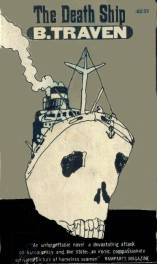
„God Bless The Death Drive” zostało w dużej mierze zainspirowane powieścią „Death Ship” Bruno Travena, wydaną w 1926 r. w języku niemieckim. Ta marynistyczna, a właściwie anty-marynistyczna powieść opowiada o losach człowieka, który w jednej sekundzie i bez najmniejszej winy traci w świetle prawa swoje tożsamość i przynależność, jest przerzucany jak niechciany kawałek mięsa z państwa do państwa, aż w końcu, zdesperowany, zaciąga się na tzw. statek śmierci (statki spisywane na straty, które przed zakończeniem żywota parają się zwykle nielegalnym handlem), gdzie przypada mu niewesoła, mówiąc delikatnie, funkcja trymera, czyli, upraszczając, człowieka ładującego węgiel do pieców, pilnującego serca rozpadającej się łajby.
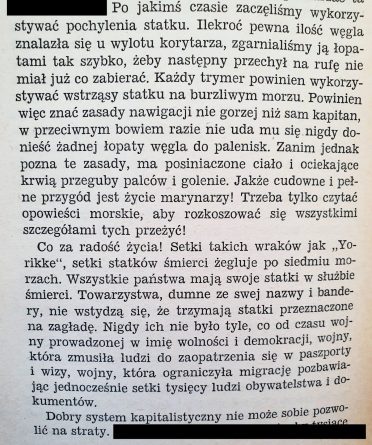 Ten sam Traven, kimkolwiek w rzeczywistości był, napisał również powieść zdecydowanie głośniejszą – „Skarb Sierra Madre”. To bardzo smutne, że mimo popularności filmu John Hustona, skądinąd wspaniałego, twórczość Travena od niemal 100 lat leży na marginesie. Kilka jego książek, w tym „Statek śmierci”, zostało nawet przetłumaczonych na język polski – można je łatwo i tanio nabyć w antykwariatach. Traven doczekał się nawet treściwego wpisu na polskiej Wikipedii, ale już na Lubimy Czytać znajdziecie tylko garstkę jego czytelników. Bardzo się cieszę, że przy okazji płyty wpadła mi ta lektura w ręce – jest to jedna z najlepszych powieści, jakie czytałem, rozpalająca chęć do życia, ale i święty gniew i ostrą gorycz w przełyku. Jeśli szukaliście kiedyś książki o wielkim głodzie wolności, ale pozbawionej toksycznej męskości Henry’ego Millera, bezdennej mizantropii „Podróży do kresu nocy” Celina’a czy emocjonalnego ekshibicjonizmu „Pyłu” Johna Fantego (przy całej miłości dla wymienionych), za to żarliwie antykapitalistycznej, antybiurokratycznej, antypaństwowej, anarchizującej oraz – kolejne A – aktualnej po dziś dzień, na dodatek jeszcze we wrażliwości na los niższych warstw społecznych nieustępującej „Na dnie w Paryżu i Londynie” Orwella, to „Statek śmierci” może wpłynąć do waszego kanonu i osiąść w nim na zawsze – yes, sir.
Ten sam Traven, kimkolwiek w rzeczywistości był, napisał również powieść zdecydowanie głośniejszą – „Skarb Sierra Madre”. To bardzo smutne, że mimo popularności filmu John Hustona, skądinąd wspaniałego, twórczość Travena od niemal 100 lat leży na marginesie. Kilka jego książek, w tym „Statek śmierci”, zostało nawet przetłumaczonych na język polski – można je łatwo i tanio nabyć w antykwariatach. Traven doczekał się nawet treściwego wpisu na polskiej Wikipedii, ale już na Lubimy Czytać znajdziecie tylko garstkę jego czytelników. Bardzo się cieszę, że przy okazji płyty wpadła mi ta lektura w ręce – jest to jedna z najlepszych powieści, jakie czytałem, rozpalająca chęć do życia, ale i święty gniew i ostrą gorycz w przełyku. Jeśli szukaliście kiedyś książki o wielkim głodzie wolności, ale pozbawionej toksycznej męskości Henry’ego Millera, bezdennej mizantropii „Podróży do kresu nocy” Celina’a czy emocjonalnego ekshibicjonizmu „Pyłu” Johna Fantego (przy całej miłości dla wymienionych), za to żarliwie antykapitalistycznej, antybiurokratycznej, antypaństwowej, anarchizującej oraz – kolejne A – aktualnej po dziś dzień, na dodatek jeszcze we wrażliwości na los niższych warstw społecznych nieustępującej „Na dnie w Paryżu i Londynie” Orwella, to „Statek śmierci” może wpłynąć do waszego kanonu i osiąść w nim na zawsze – yes, sir.
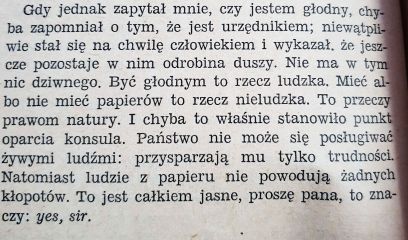
W Triple Negative, a już zwłaszcza na ich drugim albumie, obecne są zarówno esencja myśli Travena, jak i konkretne rekwizyty jego po-etyki – uwłaczające paszporty (np. „Low Noon (All Passports Are Dirty”), statek i związana z nim nomenklatura (m. in. w pięknej balladzie, śpiewanej jakby w żałobie nad wrakiem – statku czy ludzkości – „Fine Cargo Lacquer”), duchota rodem z pracy trymera oraz wynikające z niej, ale i z podłości rozmaitych systemów organizujących człowieka, obłąkanie. Co więcej, sama załoga Triple Negative jest w pewnym sensie ekwiwalentem załogi statku śmierci – trio tworzą bowiem emigranci z różnych stron świata, walczący z materią życia z dala od domu, odcięci od korzeni (jak my wszyscy, w pewnym sensie), dla których ów statek jest jednakże wieżą Babel, czyli miejscem bulgotania języków i dialektów w jednym kotle, oraz trochę niewdzięczną, ale i kochaną, bo wspólną i bijąca w rytm ich serc łajbą, która rządzi się własnymi prawami. Wszystkie te wynotowane przeze mnie dojmujące nastroje rozładowuje więc ostatecznie sama muzyka, która, będąc cudownie swobodną, anarchiczną i pozytywnie prymitywną, spełnia rolę szalupy ratunkowej.
Bardzo interesujący jest również fakt, że jeśli Triple Negative wpadają w uszach w kategorię abstraktu, to tylko przez dezorientujace przeładowanie konkretu. Pod względem karnawalizacji, czyli zawieszenia wszelkich świętości, oraz trudnego do rozebrania na części zgiełku/gwaru, mogliby przypominać Caroliner, ale grają oczywiście znacznie ciemniej – złowieszczo, funeralnie i z bardzo silnie zarysowaną krytyką społeczno-cywilizacyjną (choć tej oczywiście Caroliner nie odmawiam). Triple Negative nie chichoczą i nie dystansują się wobec świata. Prawdą jest, że mają coś wspólnego, miejscami również w samych dźwiękach, z This Heat. W szeregach zespołu krąży również miłość do Royal Trux, ale słyszalne jest to tylko w ogólnym zamiłowaniu do dekonstrukcji. Szczęśliwie jednak nie da się ich wyczerpać ani tymi, ani żadnym innym porównaniem. Za to literacko wyobraża się ich znakomicie – w istocie muzyka z tego albumu przypomina bowiem twórczość marynarzy ze statku śmierci, którzy, łapiąc chwilę oddechu w portach, oddają się graniu, i których opętańcze i rozproszone muzykowanie ma w sobie ten nieredukowalny znój egzystencji – wszystkie jej szarości, zmęczenia, lęki, piętna dehumanizacji oraz dudniące jak okrętowa syrena we mgle, nieuchronne MEMENTO MORI.
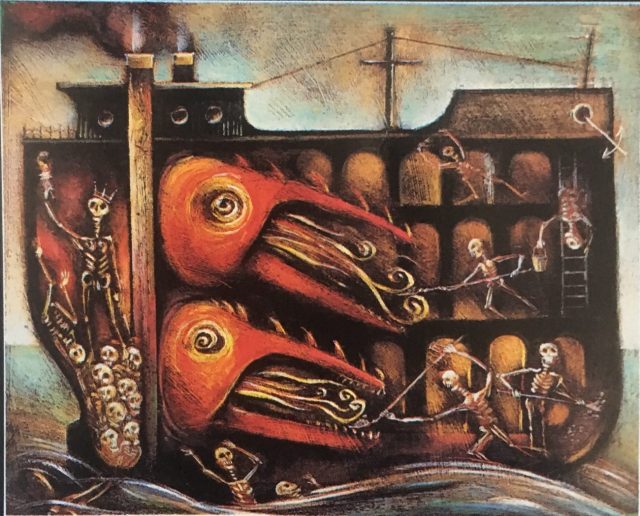
Największym zmianą w stosunku „Precious Waste In Our Wake” są utwory płynące do nas z dystansu. Wciąż więcej tu chaosu niż organizacji, ale, nie licząc bodaj 3 utworów (np. bardzo bezpośredniego „The Integrate”), nie jest już tak gęsto, wiele elementów w miksie rozkłada się na tyłach, a utwory jeszcze bardziej wydają się być nagrywane na setkę, na pełnym spontanie. Poprzednie LP, absurdalnie głośne, właściwie włamywało się przez rozrywane bębenki wprost do głowy. Tutaj z kolei większość utworów „obserwujemy” jakby oparci o framugę drzwi jakiejś szopy, w którym gdzieś na przeciwległej do wejścia ścianie wydarzają się właśnie Triple Negative. Ten dystans jednakże daje paradoksalny efekt bliskości – jesteśmy wizytatorami tego występu. Możemy poczuć zapach drewna przesiąkniętego dymem papierosowym i tanim alkoholem, zobaczyć zmęczone twarze przy barze i złamane życiem próby taneczne. W „Pugno Di Mosche” akustyka perkusjonaliów przypomina krople w starej rurze. W „See it Slay It Sordid” jesteśmy w obskurnej knajpie w jakimś 1905, w której jakimś cudem ktoś ogarnia już pierwsze sample proto-hiphopowe.
„God Bless The Death Drive” to muzyka właściwie folkowa na wskroś, ale żadnej konkretnej tradycji nie małupuje i żadnej nowej również nie tworzy. Wyrasta raczej ze zgliszczy tego, co utracone. Utwór „Bad Emotional Investments” oparty jest co prawda na kompozycji Kostisa Bezosa i Tetosa Dimitriadisa, przynależącej do greckiego nurtu muzyki ulicznej zwanej rebetiko (polecam bardzo tę, tę oraz tę kompilację niezawodnego Mississippi Records), ale są to elementy wplecione w zupełnie odmienną, bardzo współczesną, a właściwie trudną do jednoznacznego osadzenia w czasie estetykę. Nie da się jednak ukryć, że jug bandy znad Delty, trynidadzkie calypso i szereg innych, autentycznych folkowych zjawisk wypływających prosto z serca, duszy i trzewi, przenikają tę muzykę jak niezadowolone duchy zapomnianych budowniczych naszych kultur.
We wspomniane Mississippi Records, którego katalog członkowie Triple Negative z pewnością dobrze znają, można zresztą „zapakować” i sam zespoł. „God Bless The Death Drive” ma bowiem tę rzadką dziś jakość wygrzebanego z odmętów czasu i przestrzeni znaleziska, które mogłoby zostać przez tę wytwórnię wydane – tyle tylko, że w wymiarze równoległym. Wyobrażam sobie, że album ukazuje się około roku 2050 w serii kasetowejlabelu. Tytuł mógłby brzmieć tak: “The Last Folk(s) On Earth: Cultural Death Ships And Final Groans Of Protest ”.
In stock
